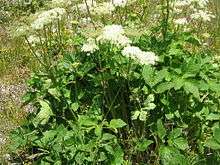Peucedanum ostruthium
| Masterwort | |
|---|---|
 | |
| Scientific classification | |
| Kingdom: | Plantae |
| (unranked): | Angiosperms |
| (unranked): | Eudicots |
| (unranked): | Asterids |
| Order: | Apiales |
| Family: | Apiaceae |
| Genus: | Peucedanum |
| Species: | P. ostruthium |
| Binomial name | |
| Peucedanum ostruthium (L.) W. D. J. Koch | |
| Synonyms [1] | |
| |

Peucedanum ostruthium or Imperatoria ostruthium, Masterwort,[2] is a species of flowering plant in the family Apiaceae. It is native to the mountains of Central and Southern Europe, but has been widely introduced outside its native range.
Distribution
Masterwort is native to the mountains of Central and Southern Europe, including the Carpathians, Alps, northern Apennines, Massif Central and isolated occurrences in the Iberian Peninsula.[3] It has, however, been widely introduced and cultivated and its native range is therefore not entirely clear.[1]
Use
Masterwort is used as a flavouring for various liqueurs and bitters. Its roots and leaves have been used in the traditional Austrian medicine internally (as tea, liqueurs and wine) and externally (as fumigation, tincture or incense) for treatment of disorders of the gastrointestinal tract, skin, respiratory tract, cardiovascular system, infections, fever, flu and colds.[4]
Chemical constituents
The plant is a source of coumarins, including oxypeucedanin, ostruthol, imperatorin, osthole, isoimperatorin and ostruthin.[5]
References
- 1 2 A. Guillén & M. Laínz (2003). S. Castroviejo, ed. Araliaceae–Umbelliferae (PDF). Flora Iberica. 10. Consejo Superior de Investigaciones Científicas. pp. 346–361. ISBN 8400081501.
- ↑ "BSBI List 2007". Botanical Society of Britain and Ireland. Archived from the original (xls) on 2015-02-25. Retrieved 2014-10-17.
- ↑ "Mästerrot, Peucedanum ostruthium (L.) Koch". Den virtuella floran. Naturhistoriska Riksmuseet. March 7, 2012. Retrieved November 6, 2013.
- ↑ Sylvia Vogl, Paolo Picker, Judit Mihaly-Bison, Nanang Fakhrudin, Atanas G. Atanasov, Elke H. Heiss, Christoph Wawrosch, Gottfried Reznicek, Verena M. Dirsch, Johannes Saukel & Brigitte Koppa (2013). "Ethnopharmacological in vitro studies on Austria's folk medicine - an unexplored lore in vitro anti-inflammatory activities of 71 Austrian traditional herbal drugs". Journal of Ethnopharmacology. 149 (3): 750–771. doi:10.1016/j.jep.2013.06.007. PMC 3791396
 . PMID 23770053.
. PMID 23770053. - ↑ Helge Joa, Sylvia Vogl, Atanas G. Atanasov, Martin Zehl, Thomas Nakel, Nanang Fakhrudin, Elke H. Heiss, Paolo Picker, Ernst Urban, Christoph Wawrosch, Johannes Saukel, Gottfried Reznicek, Brigitte Kopp & Verena M. Dirsch (2011). "Identification of ostruthin from Peucedanum ostruthium rhizomes as an inhibitor of vascular smooth muscle cell proliferation". Journal of Natural Products. 74 (6): 1513–1516. doi:10.1021/np200072a. PMC 3122331
 . PMID 21627108.
. PMID 21627108.
External links
 Media related to Peucedanum ostruthium at Wikimedia Commons
Media related to Peucedanum ostruthium at Wikimedia Commons